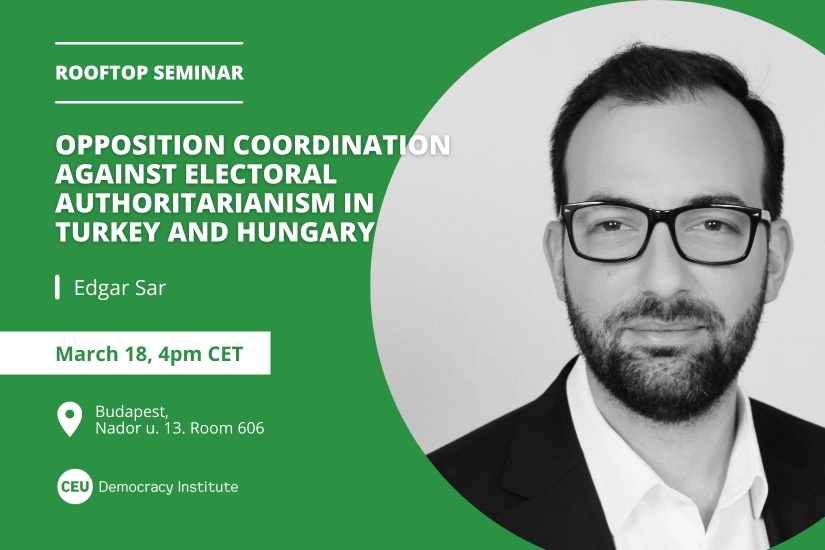
The De- and Re-Democratization (DRD) Workgroup of the CEU Democracy Institute cordially invites you to its next Rooftop Seminar. You can check our past events here.
If you would like to attend, please register here.
Please keep in mind that external guests cannot enter the building without prior registration. Due to space restrictions, attendance is limited. We ask registered visitors to pick up their temporary visiting card at the reception. The event is not open to the press.
If you would like to receive updates about our events, sign up for the DRD mailing list here.
Abstract:
Cooperation through the formation of electoral alliances emerges as the most prominent strategy to be pursued by opposition parties in electoral authoritarian regimes. However, it also entails significant risks and challenges for parties that are typically separated from each other by deep-rooted social and political fault lines to join forces and form a single bloc.
Existing literature focusing on the conditions under which opposition parties cooperate in long-standing and stable electoral autocracies identifies factors such as regime vulnerability, the perception of interdependence within the opposition, and the level of autocratic repression as prominent explanatory variables. However, the applicability of these variables may vary across different electoral autocracies. When focusing on countries with a democratic past, such as Turkey and Hungary, which have experienced serious democratic erosion through a protracted and gradual process of populist autocratization that eventually culminated in electoral authoritarianism, it appears they might not be as explanatory.
An in-depth qualitative analysis of the evolution of the cooperation strategy pursued by opposition parties during the course of autocratization in Turkey and Hungary reveals that making sense of this evolution requires the consideration of further variables. These include the incentives provided by the electoral institutions, the transformation of intra-opposition fault lines, and feedback from past experiences. Therefore, the aim of this paper is to uncover how opposition parties change their strategic approach to cooperation as an electoral strategy over the course of autocratization and, particularly, to understand when they manage to cooperate.
Speaker:
Edgar Şar is a Research Affiliate at the CEU Democracy Institute and a co-founder and the Director of Istanbul Political Research Institute (IstanPol). He received his PhD degree in political science from Boğaziçi University. His research interests include (de-)democratization, authoritarian regimes, political systems, secularism, and constitutional law. Previously a CATS Fellow at SWP Berlin, German Institute for International and Security Affairs, he engaged in a wide array of academic and policy-relevant research, projects, and initiatives. Şar regularly appears as political commentator in Turkish media and writes columns on Turkish and international affairs.
Discussant:
Sophie Jaeger is a PhD student at the Central European University in Vienna. Her research focuses on opposition against authoritarianism in the post-Soviet space. She holds an MPhil degree from the University of Oxford where she has previously worked on party discipline in systemic opposition parties under electoral authoritarianism. In her dissertation research, she studies Russian opposition organisations who contest the Putin regime from exile. The project elaborates on coordination between exiled opposition groups, aiming to advance an explanation of Russian opposition coordination in exile before and after the full-scale invasion of Ukraine in February 2022. Based on novel data from Telegram channels, the first part of the project leverages the tools of social network analysis to shed light on a phenomenon that has become increasingly wide-spread across the globe but is rarely looked at in its own right.
Chair:
Karolina Zbytniewska is a Junior Research Affiliate at the CEU Democracy Institute. She is the Chief Editor at EURACTIV Poland, a major Polish expert media focusing on European affairs. She is a Board Member at Europe's MediaLab and a political scientist specialized in democracy and populism with the academic guidance of CEU's Prof. Andrea Pető, lecturing at Warsaw University. Alumna of Fulbright, Marie Curie Research Fellowship, and Bertelsmann Leaders for Europe programme, she is currently a Re:constitution fellow. She is a regular public speaker and political commentator.